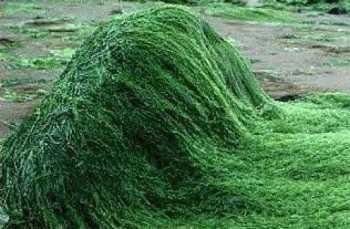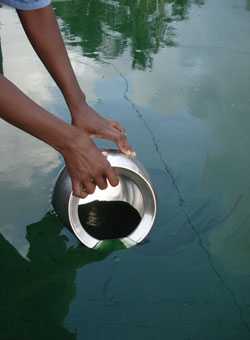Heralded by scientists as a near-miracle food, a protein-rich algae has potential to abolish malnutrition.
The blue-green 
“It gives you energy,” said Barkadressou village chief Ousmane Issa Mara in an allAfrica report. “After eating spirulina cakes, our sub-prefect did not have any more health problems. It restores appetite to children who lose it.” Barkadressou is one of the 14 spirulina-growing sites in the EU-financed $1.7 million initiative.
Spirulina is lauded for its high levels of vitamin B and iron, and 70 percent of the plant’s dry weight is protein matter. The UN Food and Agricultural Organization (FAO) commented on its “small environmental footprint,” and the ease with which it is grown and digested.
Spirulina is found in mineral-rich soda lakes. There are many such bodies of water in Chad’s Kanem region, where one in five children is malnourished.
“It is lamentable how dry and barren the area is,” said Djari Ngamai, the governor of Kanem. The salt in the soda lakes prevents the survival of most wildlife, but Spirulina thrives.
Since the start of the UN cultivation project, hungry citizens have been driving to six hours to spirulina sites to purchase food made from the algae.
Alessandro Manini, the secretary of an Italian group dedicated to using spirulina to fight global hunger, credits its absence in marketplaces and impoverished villages to a “lack of political interest.”
An FAO position paper similarly said that the algae “has not yet received the serious consideration it deserves as a potentially key crop in costal and alkaline areas where traditional agriculture struggles.”
Early research also suggests that spirulina could aid in preventing and battling measles, mumps and possibly the HIV virus, because it strengthens cell walls.
Spirulina has been eaten in various parts of the world for centuries, and is commonly served in cake or cookie form. The algae is said to be bitter or unpleasant upon first taste, and consumers liberally add herbs such as cumin when possible.
—Natalie Orenstein/Newsdesk
VIDEO: Visit a local culture of spirulina in Madurai
CITATIONS:
Highly nutritious green cakes could save lives
allAfrica, June 30, 2010
Spirulina: the little algae that could
Healthadel, April 1, 2007
What is spirulina?
January, 2009
Algae is renewable, does not affect the food channel and consumes CO2. Algae production plants are scaling up throughout the US today. To learn about the fast track commercialization of the algae production industry you may want to contact the National Algae Association. They recently came up with designs, schematics, CAPEX and OPEX for 100 acre algae production plants to be built in the US.
Spirulina is a good food for all.
This all sounds fine and dandy, people getting fed and all, but don’t we still have the problem of control and distribution of food? This method may solve nutritional issues under current conditions, but what happens when they are unable to get the food to people? I think that teaching people to cultivate food, giving them resources, and space is our best bet to solve world hunger indefinitely.
Keep your minds minds open my friends